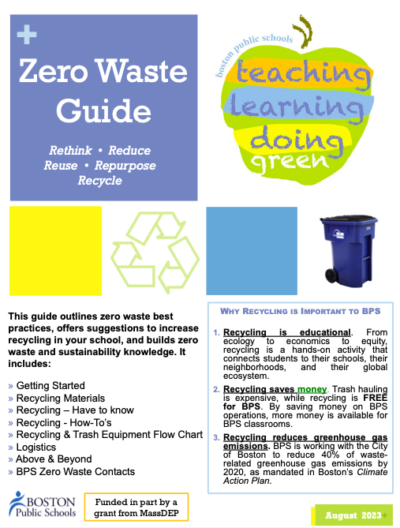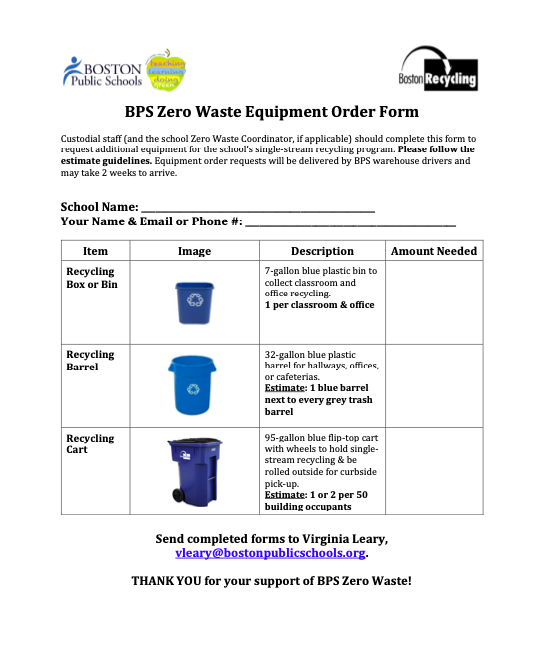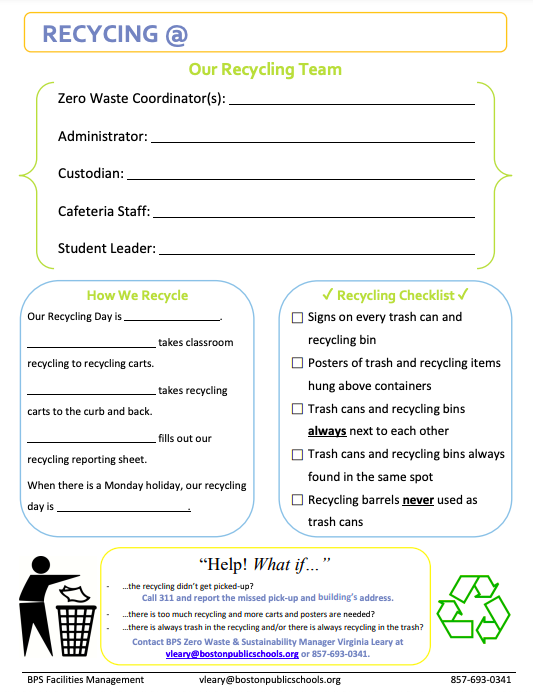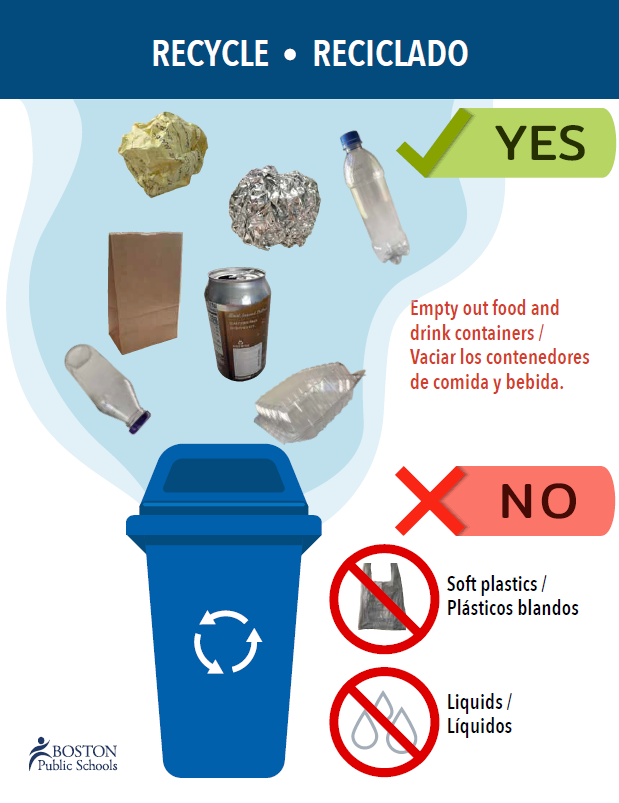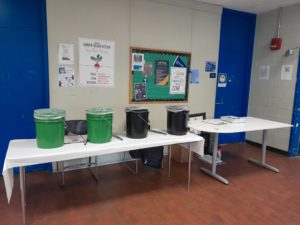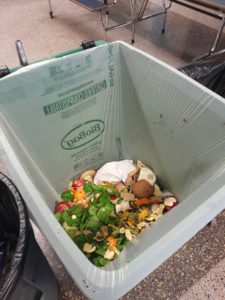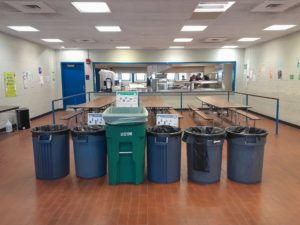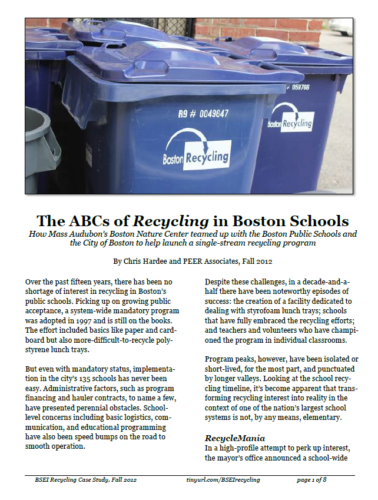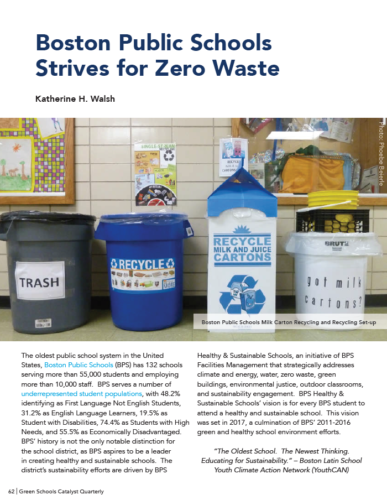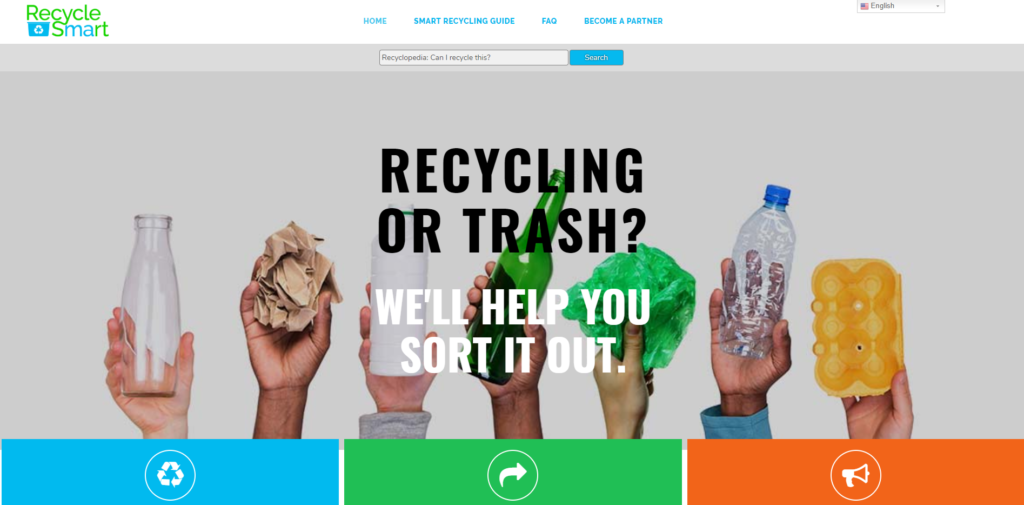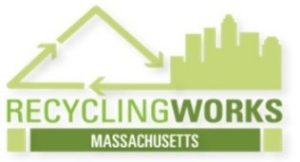BPS strives to reduce the amount of waste generated by building occupants and reduce the amount of non-recyclable waste that is hauled to and disposed of in landfills or incineration facilities.
BPS is committed to Zero Waste because:
1. Recycling is BPS district policy and Massachusetts state law. Review the Boston Public Schools Recycling and Zero Waste Policy.
2. Recycling is free for BPS, while trash is an operational cost for BPS. School recycling is picked up curbside for free by Boston Public Works Department as part of the PWD Residential Recycling program. School trash is picked up at a cost by Jet-A-Way as part of the BPS hauling contract. Increasing recycling while reducing trash decreases BPS operating costs, funds which could otherwise be directed to teaching and learning.
3. School zero waste programs mitigate clutter. Clutter attracts pests, creates asthma triggers like dust, and takes up valuable school space that could otherwise be used for teaching, learning, and organized storage.
4. School zero waste programs create hands-on learning and engagement opportunities for students and staff. A successful zero waste program incorporates education and collaboration.
5. The principles of zero waste – redesign/rethink, reduce, repurpose, replace, reuse, recycle – teach us responsibility for our school and our waste, and engages us in the three E’s of sustainability: Equity, Environment, and Economy.
Get Started with the BPS Zero Waste Guide, Equipment Order Form, and Signage
TAKE ACTION
DISTRICT HIGHLIGHTS
-
From 2017 to present, BPS Sustainability distributed new recycling equipment to BPS schools: 2017-2019: 211 curbside 95-gallon recycling carts, 228 32-gallon recycling barrels, and 4,154 classroom recycling 28-quart bins. 2019-2020: 129 carts, 105 barrels, 1043 bins. 2020 to 2021, even with the shift to remote learning: 35 carts, 47 barrels, 119 bins. From 2022 to date: BPS 34 carts, 39 barrels, 651 bins.
-
BPS schools put outside an estimated 820 95-96 gal recycling carts per week to be serviced by City of Boston PWD.
-
Hurley K-2 Teacher Jen Mohr worked with Hurley K-2 and 4th grade students and teachers to put together a “Hurley Saves the Earth” bilingual video. Ms. Mohr and the students also led an environmentally-themed assembly, created a Hurley Green Team Newsletter, and engaged in a reducing plastic waste challenge.
-
The leadership efforts of the Channing Elementary School Recycling Club were recognized with an opportunity to star in the new City of Boston Zero Waste video.
-
Sumner Elementary School kicked off the academic year with a whole school Recycling Assembly led by Recycling Teacher Leaders Anne DeVita and Ruben Carrizosa and the Student Recycling Team. Thanks to the educational outreach and the students’ leadership, the Sumner is recycling an average of 20 96-gallon carts worth of materials weekly.
-
Brighton High School’s Recycling Program enables students with moderate disabilities that are on a non-diploma track to learn leadership, organizational, and communication, and vocational skills for post secondary life. It helps them become more independent members of society and allows them to be part of the broader community of the school. The team regularly works with BHS staff and students to ensure that all recyclable materials are placed in the proper receptacles and encourage students and staff to reduce paper waste throughout the school year. The Recycling Program has reduced Brighton High’s paper waste (worksheets, projects, etc) by 39% since starting 3 years ago.
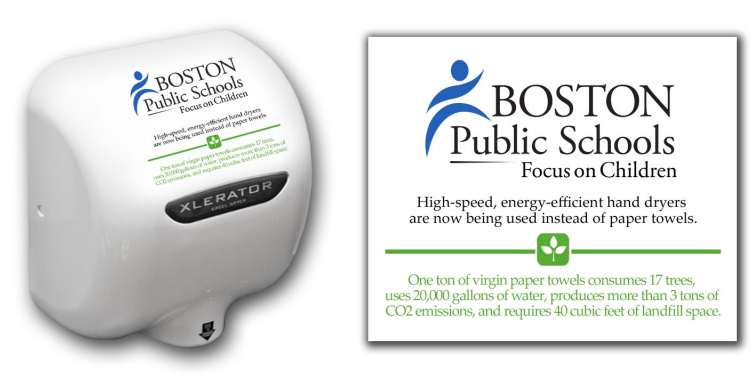
-
BPS Facilities Management installed 40 new hand dryers in student bathrooms across 10 schools, branded with the BPS logo and sustainability facts related to waste and energy. Hand dryers are also the BPS green design standard for new school building construction and major bathroom renovations, like Dearborn STEM Academy, Boston Arts Academy, and Josiah Quincy Upper School.
-
In preparation for the 2019-2020 academic year, more than 150 BPS teachers visited Re-Stream to pick-up free school supplies that were collected by Re-Stream during their customer move-outs, supplies that otherwise would have gone to the landfill, saving each teacher an average of $100-200 of avoided costs.
-
In August 2022, BPS hired its first ever Zero Waste & Sustainability Project Manager, Virginia Leary, to join the Sustainability, Energy, and Environment Program.
-
BPS is piloting a food waste-to-compost collection program. Four schools were already launched in SY22-23, with 11 additional schools planned for SY23-24. The program includes engagement and education opportunities with students and teachers, such as waste audits, compost making, and leadership/champion roles. BPS plans to use the compost in its school gardens.
-
On January 30, 2023, food waste collection services were successfully launched at Boston Green Academy (BGA), in alignment with the school’s mission and curriculum, and in partnership with the BGA school community. Several student volunteers – “Compost Champions” – along with staff from BPS Facilities Management and Food & Nutrition Services showed up in support of the new program, engaging with students on the new process for sorting their waste and diverting food from the trash.
-
Following the launch at BGA, food waste collection services were launched at Boston Latin School, Boston Latin Academy, and John D. O’Bryant School of Mathematics and Science, in collaboration with student leaders from BLS YouthCAN, BLS Recycling Club, BLA Science classes, and the O’Bryant Recycling & Environmentalism Club.
-
Zero Waste Boston
CONTACT US
Facilities Management
1216 Dorchester Ave.
Boston, MA 02125
617-635-9576
